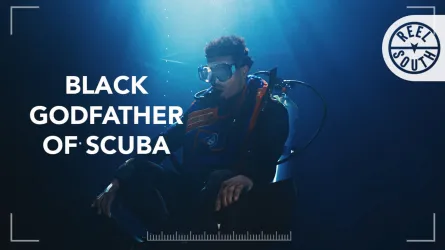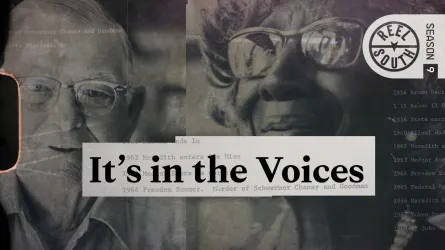In Emily Harger's "Outspoken," LGBTQ West Virginians fight to live free from discrimination, calling us to reimagine the power and longevity of a small-town queer community. Her film, debuting on Reel South April 20, tries to help Americans understand more holistically what small town LGBTQ people experience in Parkersburg, West Virginia. We connected with her about the creation of "Outspoken" and a few of her favorite things that came from the documentary.
The interview has been edited for clarity.
What inspired you to make your film?
I knew I wanted to make a film that showcased the unique experiences of small-town LGBTQ communities, but wasn't sure yet what specific direction the film would take. In 2016, I moved to the San Francisco Bay Area after living in small towns in Appalachian Pennsylvania and Ohio. The Bay Area is known for being an incredibly friendly and supportive place for LGBTQ people, though for the first few years living here I didn't feel like I quite fit in. That got me thinking about the differences in LGBTQ communities across rural and urban America. The queer communities I knew in the smaller towns I had lived in were equally thriving, equally vibrant, though we faced very different challenges than those faced by LGBTQ people in bigger cities like San Francisco. After hearing of the nondiscrimination ordinance being voted down in Parkersburg, West Virginia, I began talking to LGBTQ people in the community about their experiences living there. Most people I talked to said they had a really supportive community, despite the more public-facing discrimination that took place. I knew there was more to the story of their town that could help Americans understand more holistically what small town LGBTQ people experience.
How did you get connected to your subject?
I met the characters of Outspoken by spending time at community picnics, meetings, drag shows, birthday parties, and bible studies. After graduating from college from a university not far from Parkersburg, West Virginia, I heard about the nondiscrimination ordinance failing in their community. It felt both unsurprising and surreal to me that protections against discrimination in housing, employment, and public accommodations for all kinds of people would be voted down. I also felt connected to each character in the film through shared experiences in my own life that I saw reflected in their stories.
Were there any parts you wish you could have included in the film? If so what were they?
I filmed two sensitive conversations that I ended up needing to leave out of the film for privacy purposes, but both were very powerful to witness and were indicative of the support LGBTQ people provide for each other. One was between two LGBTQ teenagers talking about anxiety and depression, and the other between two transgender individuals sharing advice on the name-change process. These were also two special moments where I felt really connected to the characters.
Were there parts with very interesting backstories that weren't totally relayed in the final film? Or what was your favorite behind-the-scenes moment?
Montana and Lele, Ivy's mothers, have a very powerful backstory of how they fell in love. The two women met on the internet and chatted every day for months. Eventually, Montana made the decision to leave behind an unhealthy relationship and move herself and her two children across the country to live with Lele in West Virginia. She described the move as a leap of faith. Later in the family's story, their daughter Eden was pregnant at age 16. One of my favorite behind the scenes moments was sitting with Montana while she fed baby Elliot and told me the story of how they decided as a family to keep the baby. And that Elliot was a blessing in disguise for bringing their family back together. Both aspects of the family's story were left out of the film to focus more on Ivy's journey coming out as an LGBTQ teenager, but learning these past experiences in their lives greatly informed the edit.
What do you hope people learn/hope they take away from your film?
I hope people who live in smaller communities that are LGBTQ or have family or friends who are LGBTQ can watch this film and celebrate both where they come from and who they are. So often, Appalachian communities are portrayed through negative stereotypes in media, and I wanted people from Appalachia to be able to watch this film and feel like it was a positive and resilient representation of their lives. I also hope people who don't yet know or understand the LGBTQ community can watch this film and have more humility for LGBTQ people. I think the film is accessible for everyone and I hope no matter who you are or what you believe, you can be a more kind and respectful person after watching.
Is there anything else you'd like to share with the Reel South audience?
I want to be upfront about the fact that I am not from the South. Having grown up as a white woman in southwest Pennsylvania, I won't pretend I know what it's like to be a Southerner or to truly understand that experience. What I hope I can offer to the Reel South audience is a film that comes from the heart and is rooted in my own personal journey with gender, sexuality, religion, and seeking community. The years I spent working on Outspoken have made me a kinder neighbor and a better listener, and I hope the film provides this for the audience as well.
What advice would you give other filmmakers or others interested in documentary film?
Go with your gut. Is your gut telling you this is a story that needs to be told? If someone were to doubt your idea, what would your rebuttal be? And despite the lengthy list of rejections you will most definitely receive, one opportunity will shine through. I faced a lot of rejections from grants, film festivals, publications, and distributors in the process of making Outspoken. But those rejections eventually led me to PBS Reel South, which I am so grateful to be a part of.
Can you complete this sentence: "What defines you..."
What defines me is my sense of place and my background. I've lived in a lot of different places so far in the short time I've been on this earth, and each place has shaped my views of the world around me. Most importantly, I have been shaped by the places I grew up knowing and the people I grew up around. I'm recognizing that family, friendship, and the landscape around me are more and more important in my life as days go on.
Category
Share


